Introducing EAS FH Week 2023
As part of EAS FH Week 2023, we are seizing the chance to showcase the events organized by patient groups and clinics within the FH Community. We want to make FH more visible to the general public, medical professionals, and government decision-makers, demonstrating that we need to manage FH together, in close collaboration.
You are welcome to follow us on social media and join us in disseminating FH-related information within your network using the hashtags #FHWeek, #FindFH, #FHAware, and #FHAware2023.
About FHSC
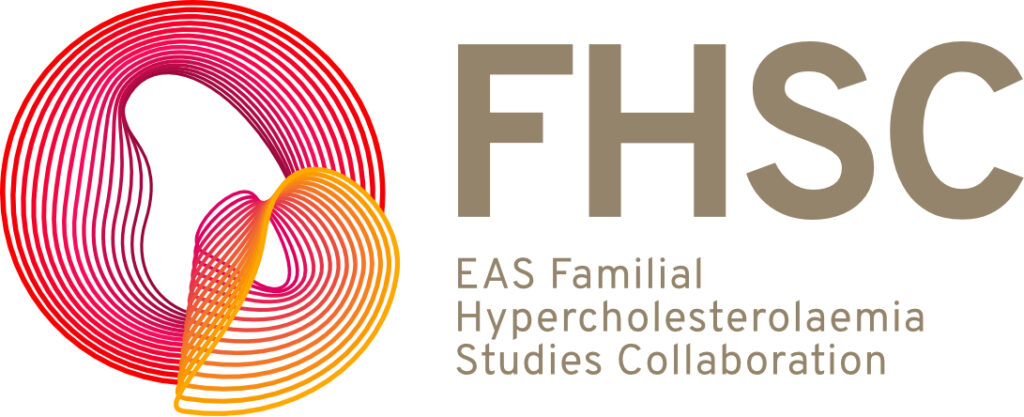
The EAS-FHSC is dedicated to enabling the medical and global communities to advocate for changes within their countries or organizations regarding the detection and management of Familial Hypercholesterolaemia (FH). Our goal is to encourage early diagnosis and more efficient treatment of this condition.
To tackle these challenges, the EAS FH Studies Collaboration (FHSC) has been gathering data from FH investigators worldwide since 2015.
Increasingly, the number of collaborating centers is growing year by year.
Read more about the EAS-FHSC objectives and structure
Think globally, act locally
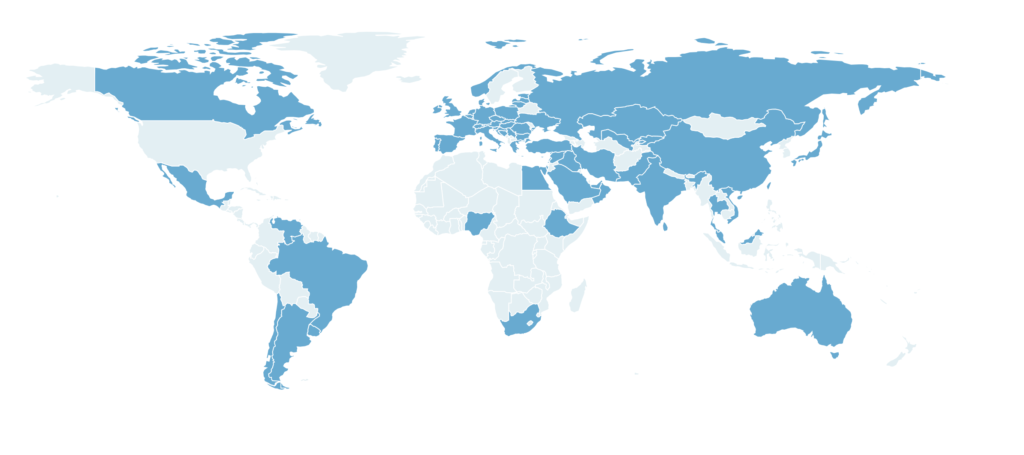
Within our network, FHSC supports national coordinating centers in their efforts to implement tailored treatment strategies aligned with their country’s unique requirements, all with the goal of lessening the global burden associated with FH.
It’s worth noting that each year, we present updates and new findings from these initiatives.
During FH Week, we aim to spotlight the successful activities and publications that emerge from these ongoing activities.
Read about FH-related national activities and recent developments
Global Network & registry: get involved
Do you have an interest in FH, collect clinical and/or genetic FH data and are keen to contribute to the EAS FHSC Global Registry (CT.gov Identifier: NCT04272697)?
If so, we would like to hear from you! For enquires contact: info@eas-fhsc.org
More information about the EAS FHSC can be found in these publications:
- FHSC Study Protocol: ‘Pooling and expanding registries of FH’
- FHSC Survey: ‘Overview of the current status of FH care in over 60 countries’
- FHSC Results: ‘A global perspective on FH: Cross-sectional study from the EAS FHSC’
FHSC Coordinating Centre provides a free essential web-based resource exclusive to FHSC Investigators and their local teams to support entering and managing local-level data, and sharing data with the FHSC Global Registry. Ask the Coordinating Centre for
more details.
The FHSC currently spans 74 countries and includes 87 National Lead Investigators.
The FHSC Registry includes 71,718 cases across 66 countries.
Let’s manage FH together

To celebrate the FH Awareness Week (September 25-29, 2023), the FH Europe Foundation and the EAS have decided to set up a series of 5 webinars devoted to FH: ”Let’s manage FH together”
Thanks to the collaboration of members of the Foundation and the Executive Committee of the Society, an original program was set up combining both medical doctors and patient experts.
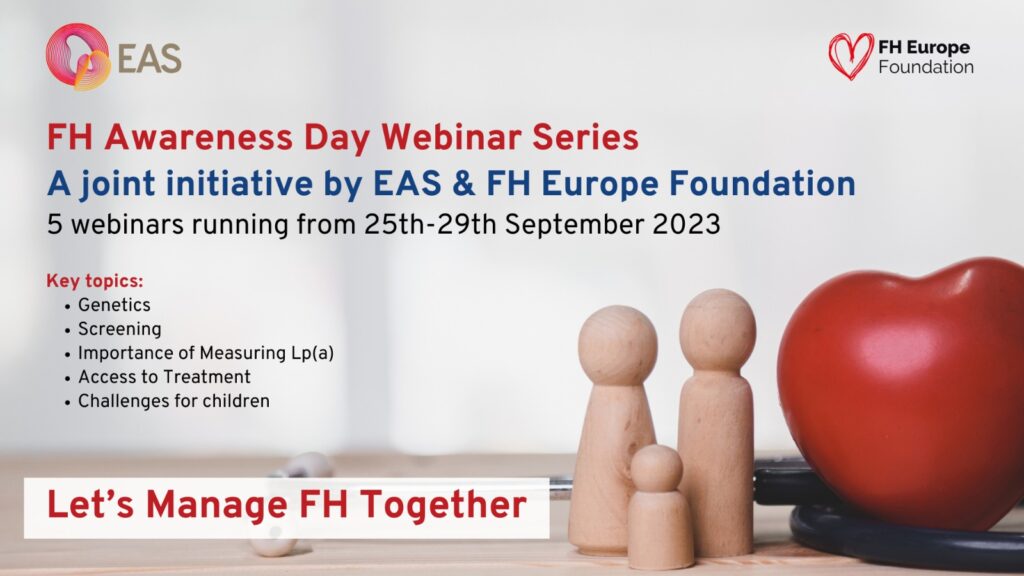
5 webinars spending 30 minutes will cover several hot topics. You can find out more, meet the speakers, and sign up for individual webinars by clicking on these links:
September 25 (Monday), 18:00 CET
Genetics in HeFH and HoFH: the latest insights
September 26 (Tuesday), 18:00 CET
Experience from cascade screening, universal screening, and latest insights on screening on the EU level
September 27 (Wednesday), 18:00 CET
Importance of Measuring Lp(a) in patients with HeFH & HoFH
September 28 (Thursday), 18:00 CET
Access to Treatment for HeFH and HoFH
September 29 (Friday), 18:00 CET
Challenges for Children with FH
A large area will be dedicated to live Q&A, with the question being taken via the Zoom chat.
Explore FH Webinar Series themes and relevant publications
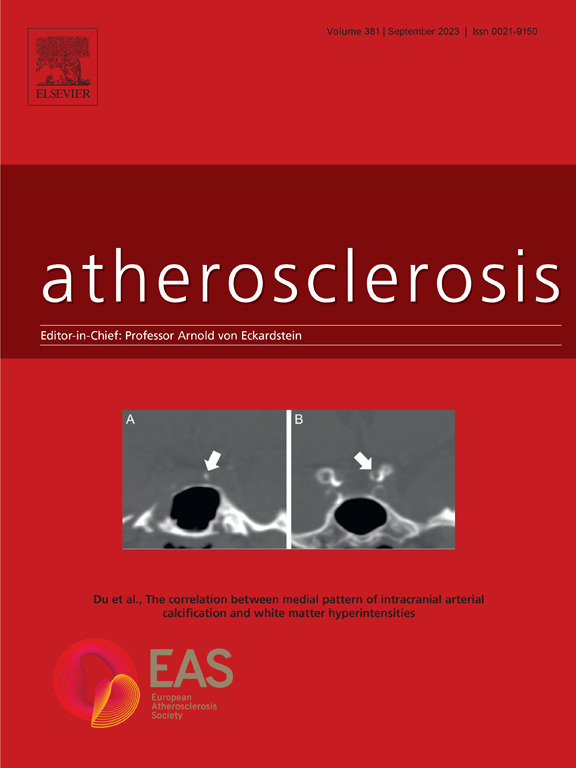
Discover a collection of publications related to FH from the Atherosclerosis Journal, featuring a selection of the latest and most widely-read titles.
FH Webinar Series themes and relevant publications
Lectures from the EAS Congresses including 2023 available on the EAS Academy

Many aspects of FH are an important area of discussion for our scientific community. We have collected FH-related lectures from our latest congresses. They are published here for free during FH Week. All you need to do is use your EAS username and password to log in.
Lectures related to FH from the EAS Congress
FH Europe at the Science Summit at the United Nations General Assembly
(UNGA78) in New York
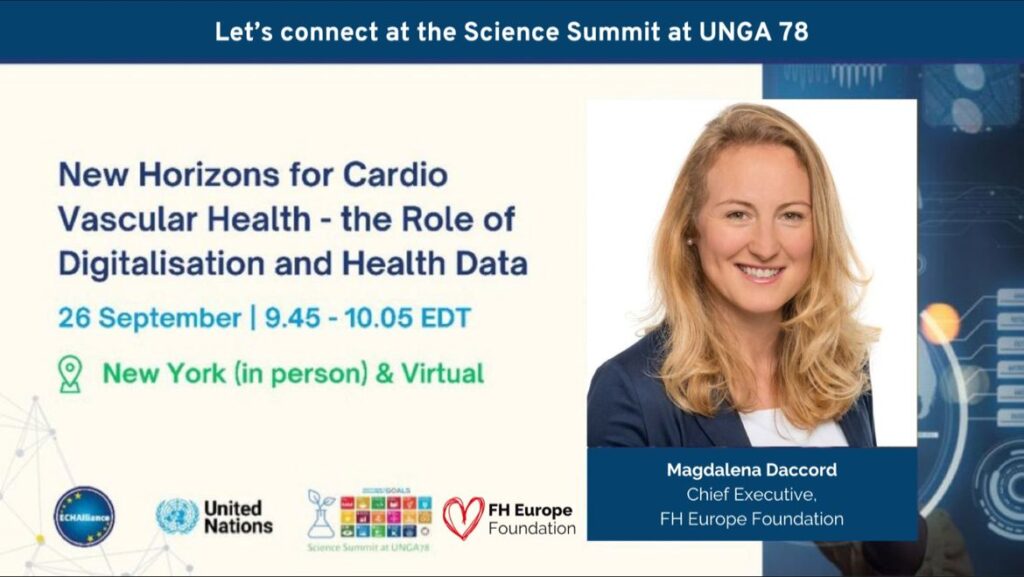
We are delighted to invite you to join FH Europe Foundation at the upcoming 9th edition of the Science Summit at the United Nations General Assembly (UNGA78) in New York. On Tuesday, September 26th, Dr Marius Geanta, our Trustee and Chair of the Policy and Innovation Advisory Committee, will present in a dedicated session “New Horizons for CVH globally – the role of digitalization and health data” the topic of “A personalised approach to preventing the preventable using digitalisation and health data”.
This is a unique opportunity for us to put cardiovascular health (CVH) and inherited lipid conditions on the global health map, with a major Call for Action.
We will build on our advocacy journey for familial hypercholesterolaemia (FH) paediatric screening, the Slovenian High Level Technical Meeting, the Czech EU
Presidency meeting on FH screening and the outcome of it – the Prague Declaration, which has been widely endorsed in Europe and beyond. We will also present our new global strategy on tackling Lp(a) and the importance of systematic testing and managing effectively elevated Lp(a) as an independent risk factor associated with cardiovascular diseases (CVD).
The ECHAlliance Global Health Connector two-day event “Unlocking Solutions for Global Health Challenges” will take place at the CURE in New York and virtually, on 26-27 September. This internationally important event is a global platform that brings together leaders, scientists, technologists, industry,
policymakers, and innovators to promote the role of science in achieving the UN Sustainable Development Goals (SDGs) for a better shared future and to prepare
the UN Summit of the Future 2024.
For the full programme and to register (online or in-person) click here.
The EAS Lipid Clinic Network (LCN)
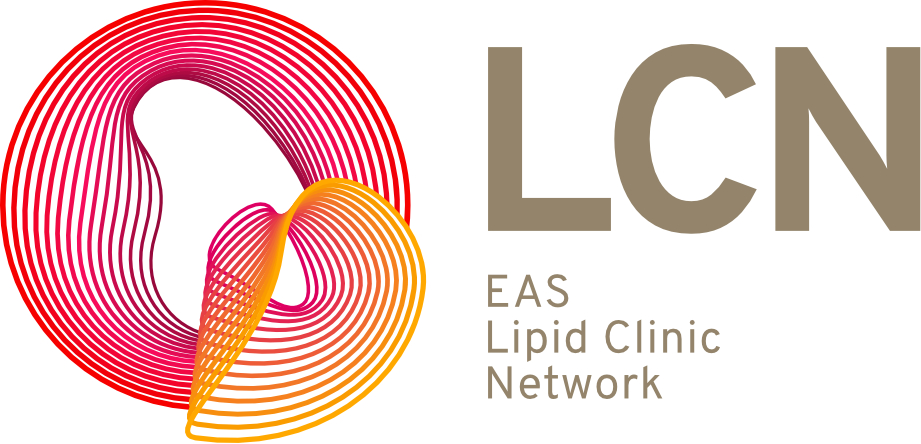
Working together to address challenges in management of lipid disorders in European countries. The LCN will provide a structure to establish uniform EU-wide standards of diagnosis, management and treatment of patients with lipid disorders, based on the ESC/EAS Guidelines on management of dyslipidaemias.
The LCN now consists of 39 nations and 380 clinics.
Read more about the EAS Lipid Clinic Network (LCN)
FindMyLipidClinic.com – a Global Web-Based Directory of Lipid Clinics
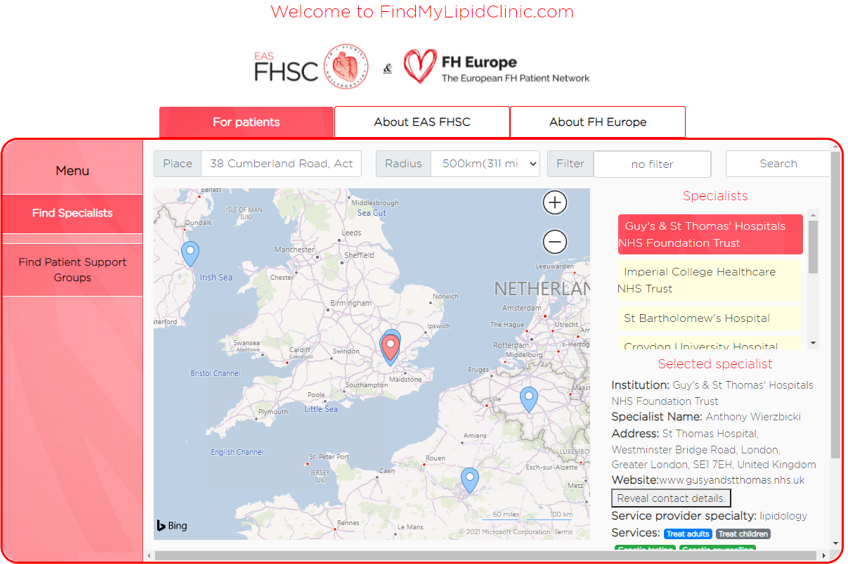
The EAS FHSC Global Registry compiles secondary, unidentifiable, anonymised data on the burden of FH worldwide. These secondary data are sourced from active FH patients registries, independent and external to the FHSC, worldwide. The FHSC Global Registry is led by the FHSC Coordinating Centre at Imperial College London.
This innovative tool not only allows its users to find specialists and support organisations around a location. It goes further by allowing its users to filter specialist clinics according to the services they offer (e.g. treating adults or children, genetic testing, Lp(a) testing, which imaging test, etc.). FindMyLipidClinic.com has been translated and made available in 29 languages to reach more patients worldwide.
FindMyLipidClinic.com is GDPR compliant, it does not store any users’ personal information, and is reasonably accessible to visually impaired people.
Recent publications from the EAS on FH
2023 Update on European Atherosclerosis Society Consensus Statement on Homozygous Familial Hypercholesterolaemia: new treatments and clinical guidance
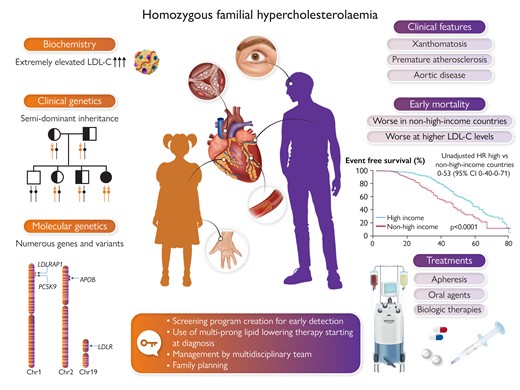
In 2014, the European Atherosclerosis Society published a consensus statement specifically focused on homozygous familial hypercholesterolaemia (HoFH) (1), aiming to improve the care of individuals with this rare and difficult-to-treat condition. This statement subsequently catalysed initiatives to refine what is meant by ‘HoFH’ in terms of genetics, new therapeutic approaches, as well as a global registry on HoFH care to inform health policy. The Homozygous Familial Hypercholesterolaemia International Clinical Collaboration (HICC) registry, an international network of healthcare providers managing HoFH patients, provided important information on the burden of HoFH. With data from over 750 HoFH patients across 38 countries (2), the HICC registry showed that patients were diagnosed too late (median age of 12 years), when one in 10 had already experienced a coronary event. Treatment disparity between high and non-high-income countries was also evident, impacting patient outcome, with a first cardiovascular event occurring about a decade earlier among those in less affluent versus high income countries (2).
The 2023 update to this HoFH consensus statement has addressed several areas of persistent concern (Box 1) (3). A key strength is provision of updated diagnostic criteria for HoFH, with the recommendation to prioritise phenotypic features over genotype. Importantly, an untreated low-density lipoprotein cholesterol >10 mmol/L (>~400 mg/dL) is suggestive of HoFH and should prompt further evaluation.
Worldwide experience of homozygous familial hypercholesterolaemia: retrospective cohort study
Homozygous Familial Hypercholesterolaemia International Clinical Collaboration (HICC) registry
The Lancet. https://doi.org/10.1016/S0140-6736(21)02001-8.
Published Online January 28, 2022
What the authors conclude
Worldwide, patients with HoFH are diagnosed too late, undertreated, and at high premature ASCVD risk. Greater use of multi-LLT regimens is associated with lower LDL cholesterol levels and better outcomes. Significant global disparities exist in treatment regimens, control of LDL cholesterol levels, and cardiovascular event-free survival, which demands a critical re-evaluation of global health policy to reduce inequalities and improve outcomes for all patients with HoFH.
Global perspective of familial hypercholesterolaemia: a cross-sectional study from the EAS Familial Hypercholesterolaemia Studies Collaboration (FHSC).
The Lancet 2021. https://doi.org/10.1016/S0140-6736(21)01122-3
Published: September 07, 2021
What the authors conclude
Familial hypercholesterolaemia is diagnosed late. Guideline-recommended LDL cholesterol concentrations are infrequently achieved with single-drug therapy. Cardiovascular risk factors and presence of coronary disease were lower among non-index cases, who were diagnosed earlier. Earlier detection and greater use of combination therapies are required to reduce the global burden of familial hypercholesterolaemia.
Joint publication — Global Call to Action on FH — FH scientific & patient groups tackle burden of FH
2nd January 2020 – The EAS, together with FH Studies Collaboration and FH Europe, and in collaboration with the World Heart Federation (WHF), IAS and FH Foundation announced today the publication of a Global Call to Action on familial hypercholesterolaemia (FH) — a vastly under-recognized and poorly managed public health concern — in JAMA Cardiology. Authored by a global panel of scientific experts, public health officials, advocacy leaders and individuals with FH from 40 countries, the report notes glaring gaps in screening and guideline-based care for FH, the most common cause of early and aggressive heart disease.
Conclusions and Relevance By adopting the 9 updated public policy recommendations created for this document, covering awareness; advocacy; screening, testing, and diagnosis; treatment; family-based care; registries; research; and cost and value, individual countries have the opportunity to prevent atherosclerotic heart disease in their citizens carrying a gene associated with FH and, likely, all those with severe hypercholesterolemia as well.
Read the article in JAMA Cardiology
Overview of the current status of familial hypercholesterolaemia care in over 60 countries – The EAS Familial Hypercholesterolaemia Studies Collaboration (FHSC)
https://www.atherosclerosis-journal.com/article/S0021-9150(18)31359-5/fulltext
Atherosclerosis. October 2018. DOI: https://doi.org/10.1016/j.atherosclerosis.2018.08.051
Highlights
- The EAS FHSC is an international initiative involving a network of investigators interested in FH from around 70 countries.
- Information on FH prevalence is lacking in most countries; where available, data tend to align with contemporary estimates.
- FH diagnosis and management varies widely across countries, with overall suboptimal identification and under-treatment.
- In most countries diagnosis primarily relies on DLCN criteria, and less frequently on Simon Broom or MEDPED.
- Therapy for FH is not universally reimbursed, and criteria vary across countries. Access to PCSK9i and apheresis is limited.
What the authors conclude
FH is a recognised public health concern. Management varies widely across countries, with overall suboptimal identification and under-treatment. Efforts and initiatives to improve FH knowledge and management are underway, including development of national registries, but support, particularly from health authorities, and better funding are greatly needed.
Pooling and expanding registries of familial hypercholesterolaemia to assess gaps in care and improve disease management and outcomes: Rationale and design of the global EAS Familial Hypercholesterolaemia Studies Collaboration
Atherosclerosis Supplements 22 (2016) 1-32
The potential for global collaborations to better inform public health policy regarding major non-communicable diseases ha-, been successfully demonstrated by several large-scale international consortia. However, the true public health impact of familial hypercholesterolaemia (FH), a common genetic disorder associated with premature cardiovascular disease, is yet to be reliably ascertained using similar approaches. The European Atherosclerosis Society FH Studies Collaboration (EAS FHSC) is a new initiative of international stakeholders which will help establish a global FH registry to generate large-scale, robust data on the burden of FH worldwide. Methods: The EAS FHSC will maximise the potential exploitation of currently available and future FH data (retrospective and prospective) by bringing together regional/national/international data sources with access to individuals with a clinical and/or genetic diagnosis of hetero··.ygous or homozygous FH. A novel bespoke electronic platform and FH Data Warehouse will be developed to allow secure data sharing, validation, cleaning, pooling, harmonisation and analysis irrespective of the source or format. Standard statistical procedures will allow us to investigate cross-sectional associations, patterns of real-world practice, trends over time, and analyse risk and outcomes (e.g. cardiovascular outcomes, all-cause death), accounting for potential confounders and subgroup effects.
What the authors conclude
The EAS FHSC represents an excellent opportunity to integrate individual efforts across the world to tackle the global burden of FH. The information garnered from the registry will help reduce gaps in knowledge, inform best practices, assist in clinical trials design, support clinical guidelines and policies development, and ultimately improve the care of FH patients.
Familial hypercholesterolaemia: A global call to arms
https://www.atherosclerosis-journal.com/article/S0021-9150(15)30130-1/fulltext
Atherosclerosis. September 17, 2015. DOI https://doi.org/10.1016/j.atherosclerosis.2015.09.021
Familial Hypercholesterolaemia (FH) is the commonest autosomal co-dominantly inherited condition affecting man. It is caused by mutation in one of three genes, encoding the low-density lipoprotein (LDL) receptor, or the gene for apolipoprotein B (which is the major protein component of the LDL particle), or in the gene coding for PCSK9 (which is involved in the degradation of the LDL-receptor during its cellular recycling). These mutations result in impaired LDL metabolism, leading to life-long elevations in LDL-cholesterol (LDL-C) and development of premature atherosclerotic cardiovascular disease (ASCVD). If left untreated, the relative risk of premature coronary artery disease is significantly higher in heterozygous patients than unaffected individuals, with most untreated homozygotes developing ASCVD before the age of 20 and generally not surviving past 30 years. Although early detection and treatment with statins and other LDL-C lowering therapies can improve survival, FH remains widely underdiagnosed and undertreated, thereby representing a major global public health challenge.
Statement by EU Commissioner Kyriakides on the occasion of the World Heart Day: “With every beat of my heart”

On 29 September, we celebrate World Heart Day. On this occasion, EU Commissioner for Health and Food Safety, Stella Kyriakides made the following statement:
Join us on Social Media
Follow us on social media and help connect and disseminate the FH related information within your network using #FHWeek, #FindFH, #FHAware & #FHAware2023. During FH Week, a series of newsletters are going out to EAS members and stakeholders and FH related information is published daily in our social media channels.
Facebook: European Atherosclerosis Society (EAS) & Congress
Instagram: European Atherosclerosis Society
Twitter: EAS Society
LinkedIn: European Atherosclerosis Society
